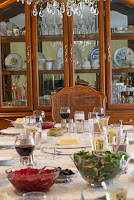 |
| [Thanksgiving table*] |
There is a universal element in Thanksgiving. People of all stripes and colors get together and eat the same menu, with small variations. Even when alternatives are far tastier (my brother persuaded my mother to make paella one year), it is somehow sacrilegious to not eat turkey this Thursday. Even more notable, three generations of a family strive to sit together and talk, not a common occurrence in the United States. The table is set for a royal feast, with all the finest pieces being used. For the children, it is a wonderful time to play with cousins without close parental supervision. Thanksgiving is above all a family occasion.
Of course, each family has its own traditions. In my family, there was a children’s table, with the symbolic presence of my great uncle who, due to a stroke, could barely speak. Various relatives brought their specialties, including my aunt who made the incredible apple and pumpkin pies. As we grew older, we children were allowed to have gin and topic as we munched on homemade guacamole. I would play hearts, the card game, with aunt and great aunt, who would curse to the great shame of her daughter and our amusement. My father would always read the Art Buchwald column on explaining Thanksgiving to the French, still a classic. Whether we children were unaware or did not care, the adults would quietly criticize each other despite their best efforts to keep their mouths shut. I think we found their remarks irrelevant and amusing. Who cares if a certain aunt does not know how to dress properly? My cousin and I would play piano, she far better as she was much more serious than I and still is. It was a special day.
I wish I had a picture to show you of those occasions. However, this is a Thanksgiving past, before the time of cell phones and, more importantly, an awareness of the importance of taking pictures on such occasion. I believe there almost everybody there has a sense that this event was a given, an occasion that would happen every year, year in, year out, and somehow exempt from the effects of time.
Alas, nothing stops time, not even Thanksgiving. The generation of my grandparents has long gone to the grave. Of my parents’ generation, only my mother (96 years old) is alive but no longer capable of preparing a feast for 4 people, let along 20+. As for the children, alas, we have drifted, geographically and/or emotionally. Some of us belong to our adopted families. I have not lived in the US for some 35 years now nor celebrated Thanksgiving in that period.
Unlike in Dickens’ book, in my case, there is no ghost of Thanksgiving present. My brother will celebrate the holiday with this wife’s family. I am not sure that I will remember that Thanksgiving is Thursday at all as there is no hint of the holiday in Israel, especially with the war going on. My mother will be alone. I do share and concur with her comment: she can live without celebrating Thanksgiving because her Thanksgivings were so wonderful. So, ghosts of Thanksgiving past are loyal friends.
To those celebrating the holiday Thursday , treasure the day even if the food is a bit heavy and the family is a bit annoying. The memories are priceless.
* Picture captions help the blind fully access the Internet.